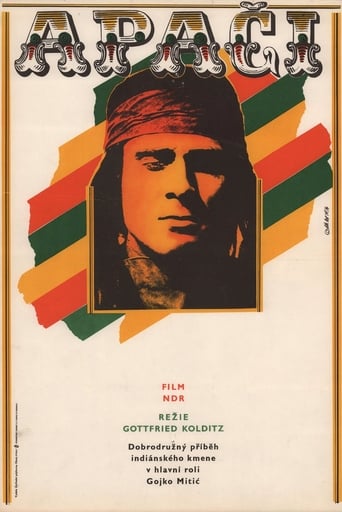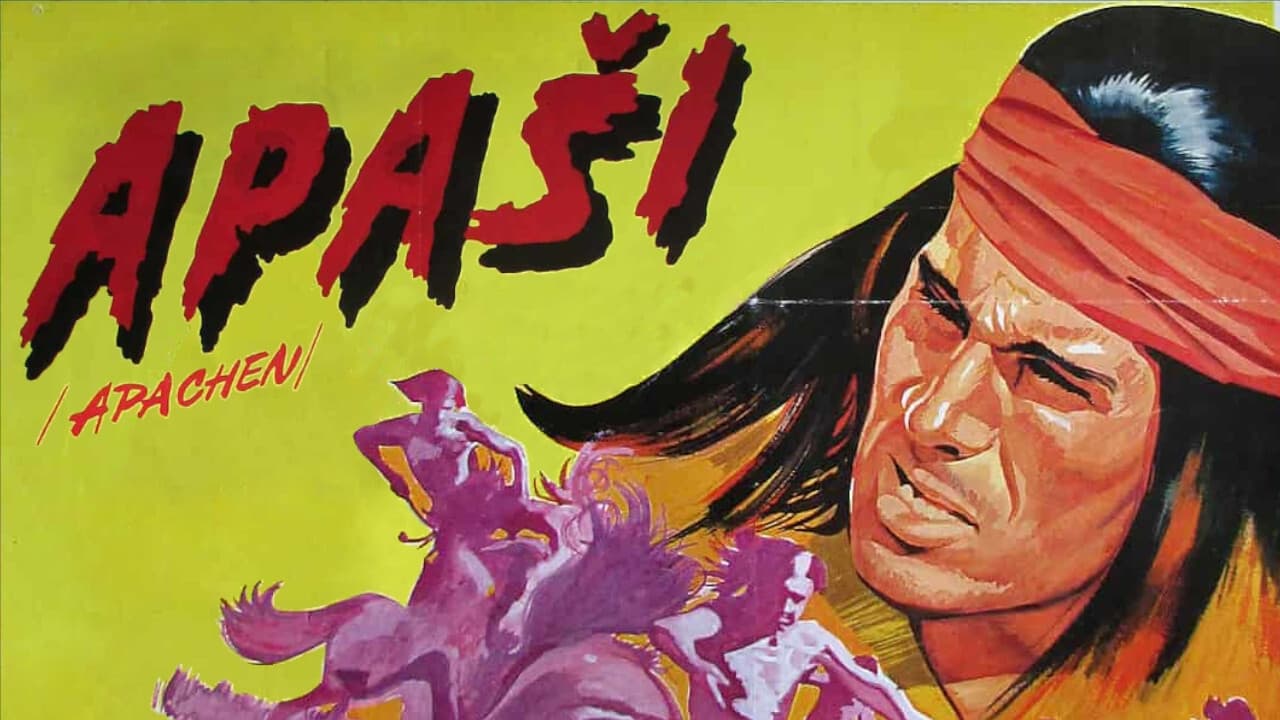ma-cortes
Here stars the famous chieftain Apache named Ulzana seeking vengence and battling a vicious scalphunter called Johnson and his henchmen in the region of Picos Altos, Mexico , where dangerous people are looking for copper . As an Apache tribe of the Mimbrero led by Ulzana is peacefully settled when they go to Santa Rita village to buy and sell products .Then a group of American/Mexican cutthroats attack and kill the peaceful Indians carrying out an extremely violent slaughter. But Ulzana escapes and he seeks revenge against his enemy.Indian Eurowestern is loosely based on the legendary Apache warrior . A violent , gritty Western that enjoyed success in the Eastern countries. It shows the life of an Indian tribe , the sufferings , feats , attacks and a bloody massacre, including creepy scalphunting .The picture has thrills , emotion, action-packed , assaults and violence . Exciting though it is , the film isn't without its thoughful side , it has drama and action in equal measure . It is is well starred by Gojko Mitic one of the most known and most loved players in Eastern countries. He was born on June 13, 1940 in a village of the previous Yugoslavia , now Serbia. His first roles were as an Indian secondary in the known Winnetou/Old Shatterhand films as Winnetou or Treasure of the silver lake, Winnetou 2 Last of the renegades, The Vultures, Winnetou: The last shot . His first main role was as Tokei in the movie from the East German : Sons of the Great Bear. This was the beginning of a long career playing Indian chieftians such as Severino , Last Mohican's Chingachcook , Blutsbruder , White Feather , Tahmahkera , Ulzana and even the famous Winnetou in TV. They were all successful but he was always dubbed because of his accent . Mitic became a charming man among the women because of his attractive and glamour , and even playing the heroic slave rebel called Spartacus . His movies became popular in Germany , Yugoslavia and even the USA. It has an atmospheric as well as thrilling musical score , and the catching score remembrance Spaghetti Western soundtrack . And an evocative cinematography , but a remastering being really necessary because of film copy is washed-out . Shot in Samarkand , Uzbekistan , Romania and the wonderful Yugoslavian lanscapes .Ulzana feat was also adapted by Robert Aldrich in 1952 as Ulzana's Raid with Burt Lancaster , Bruce Davison , Jorge Luke and Joaquin Martinez as Ulzana . This motion picture titled Apachen 1973 had a sequel titled Ulzana 1974 , being regularly directed by Gottfried Kolditz , cowritten by Gojko Mitic and financed by Deutsche Production or Defa. I would like to recommend it to those who appeal Pasta/Paella Westerns usually filmed in Spain.
berberian00-276-69085
So, I decided to write few lines for the IMDb review service again. I reckoned not to write lately at all because of my sight failure (age connected, I presume) but anyway let's proceed.Who is Gojko Mitic and is there such thing as "Macho Legacy" coming from the Balkans (for those who lack geographical orientation this is part of Eastern Europe, running from the Alps to the Bosphorus with Istanbul and sometimes historically was first time called Europe). Gojko Mitic comes from a small town in Eastern Serbia near the Bulgarian border. He has the looks of a typical Shopi from the region. Other famous figures from the region are nowadays Bulgarian Premier Bojko Borisov, etc.Hell, I forgot my point. Mitic's films, as a rule made by resemblance with spaghetti western, were shot in the mid-1960s to mid-1970s and after that he lost significance as Movie Star (for reasons I am not well aware). But in this 15 years period he was really something on the Big Screen, while I remember the full saloons from that time and it was always difficult to get tickets for his movies. In Eastern Europe Gojko Mitic was an action star with caliber and popularity of the great French actors of the adventure cinema such as Alain Delon, Jean-Paul Belmondo, Jean Marais, Lino Ventura, etc.The westerns themselves were produced by Deutsche Film (DEFA) of Eastern Germany and shot respectively at different locations in Eastern Europe but mainly in former Yugoslavia (not as someone mentioned in far eastern Uzbekistan). Gojko Mitic get noticed in some small appearances at the Winnetou franchise series and then was offered the leading role in the DEFA westerns. Whomever it concerns and because I am staunch physiognomy reader, here in Apachen (1973) and its sequel Ulzana (1974) the tandem Gojko Mitic and Colea Rautu (Romanian actor playing an aging whiskey drinking Indian) look much alike another odd couple from a most remembered Hollywood movie - i.e., Rocky (1976) with Sylvester Stallone and Burgess Meredith (an aging boxing trainer). So be it!Lastly, there was a very popular song in Bulgaria from the 1990s about Gojko Mitic with trailer from his movies. Enjoy your time!
Blaise_B
East German western from 1973 with a revenge plot involving the massacre of Apache by white mercenaries in the employ of both the US and Mexican governments in which the heroes are Apache. Well directed and beautifully shot, apparently in Romania and Uzbekistan, and the eighth of twelve westerns from the point of view of various tribes starring, and in this case co-written by, Gojko Mitic, who was a star in Eastern Europe because of these films.APACHES was made in a communist country during the cold war and it's easy to see what the angle may have been, how the "white eyes" villains could represent capitalism, especially during a scene in which the Apache steal the water and horses from a band of travelers, leaving them stranded in the desert, then sit back and watch as they kill each other off. They are self-centered and greedy, thus unable to cooperate long enough to survive a bad situation. The indigenous tribes, known for boundless generosity to those not their enemies, not having a concept of private property, could easily fit the socialist ideal. Not the reality, mind you, but the ideal.What's really funny, though, is that this movie, by the standards of what we know today, really doesn't play like propaganda. It feels much more authentic than any Spaghetti Western I've seen on the subject--NAVAJO JOE immediately comes to mind--and at times even plays like "Blood Meridian" from the point of view of the Indians. It was supposedly based on research of a real-life massacre that occurred at the beginning of the Mexican-American war.The costumes and production design are great and the action scenes are great and despite all my prattling about sociopolitical context, it's an entertaining western, which I'm sure is what it was intended to be. The villain looks a lot like the Italian actor Piero Lulli, smokes a giant cigar, and uses a whip. The music sometimes reminds me of Spaghetti Westerns, especially Stelvio Cipriani's score for THE UGLY ONES, but ultimately has a style all its own.The First Run DVD has a ten-minute trailer featuring scenes from this and other East German westerns that ends by announcing, "All this material will be restaurated soon." I'm definitely anxious to find out how soon.
John Seal
Late to the cultural ball as usual, the East German film industry took note of the 'political spaghetti western' trend of late '60s Italian cinema and tried to shoehorn their own brand of anti-imperialist Marxism-Leninism into the genre. The results are mixed. Crudely directed by Gottfried Kolditz, the film tells the story of Ulzana (sauerkraut western veteran Gojko Mitic), an Apache chief who has reached a rapprochement with the local Mexican population and generously extends it to whites who travel through the territory. His people have become inured to the treacherous ways of the white man, however, and are now reliant on them for booze, 'relief flour' and beef steak. They also haven't counted on the mendacity and greed of 'Amerikanishe gangsters' such as Mr. Johnson (Milan Beli), who could care less about treaties or gentleman's agreements and simply wants to get his capitalist mitts on the local copper deposits. Though the film is not particularly well made, it is well acted, and the story is a disturbingly accurate rendering of the lengths to which we have gone to steal the land and birthright of indigenous peoples across the world. Whether in the rain forests of Central and South America, the jungles of Irian Jaya, or the Old West, we've done a tip-top job of raping the earth and killing those who get in the way of 'progress'. Alas, Apachen also relies on some of the laziest stereotypes of the noble savage, sapping much of its potential as an educational tool and rendering it barely a step or two ahead of an Old Shatterhand picture. Recently deceased Polish actor Leon Niemcyzk (here looking a lot thinner and gaunter than in Knife in the Water) pops up as a Mexican miner, and there's a decent if derivative score from Hans-Dieter Hosalla. On balance, it's a fascinating take on the genre and will entertain anyone with a penchant for Eurowesterns. While it's politically astute, however, the need to toe an ideological line leaves it, in some regards, counter-intuitively less radical than some of the angry films of Sollima and Parolini--films produced in the belly of the capitalist beast.


 AD
AD


